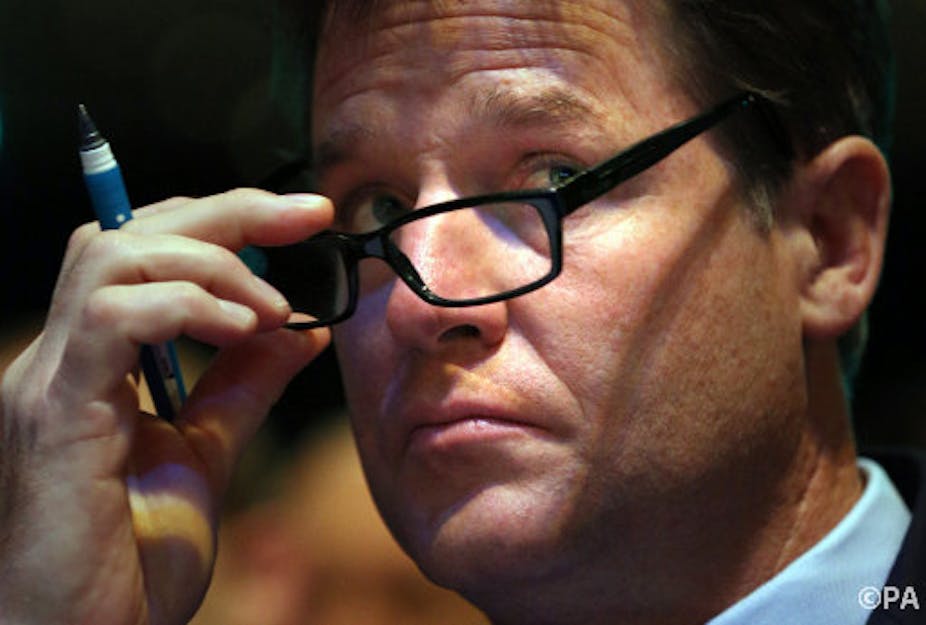David Cameron’s announcement in January last year that the Conservatives would hold a referendum in 2017 if his party were to win a majority in the 2015 general election was a watershed moment in the history of the UK’s troubled relationship with the European Union. Under pressure from his own backbenchers and the growing influence of both the UK Independence Party (UKIP) and a predominantly anti-EU tabloid press, Cameron’s concession galvanised opponents of the EU and showed just how mainstream “hard” Euroscepticism has become in the UK.
Nigel Farage and Nick Clegg’s two television debates on EU membership confirmed how advanced this process is. With both Labour and the Liberal Democrats still opposed to a referendum on UK membership and with uncertainty lsurrounding Cameron’s ability to re-negotiate any significant powers from Brussels, the momentum continues to shift further towards the Eurosceptic camp.
The pressure for a referendum is likely to intensify further with UKIP’s showing at next month’s European elections, particularly if Nigel Farage’s party emerges as the leading UK party in the European Parliament. This would be the first time since World War I that a party other than Labour or the Conservatives has been the winner in a national electoral context.
What the two TV debates have underlined is that a referendum looks increasingly unwinnable for those in favour of UK membership. According to YouGov, Farage was declared the winner in the first LBC debate by 57% of respondents and by 68% after the subsequent BBC contest. In isolation, these figures are not really surprising. The Eurosceptic camp are simply more likely to have watched the debate, given both the intensity of their beliefs and the fact that a televised contest of this nature has been such a long time coming.
More significant is the 11% increase in support for Farage between the two contests. Evidence from the two debates strongly hints that the electorate is most likely to be swayed in a future referendum by emotional and psychological arguments that draw on notions of sovereignty, identity and general opposition to change; they seem less likely to be won over by arguments based on “rational choice” and economic interest – in other words a rational argument over whether the benefits of EU membership outweigh the costs.
Hard feelings
In the first debate, Clegg pitched the thrust of his argument around the “rational choice” dimension, persistently referring to the economic consequences of withdrawing from the EU, stating that 3m UK jobs were at stake and citing the likelihood that companies such as Siemens, Nissan and Ford would relocate their operations abroad if the UK were to exit.
In the second debate, however, the deputy prime minister played the economic card much less frequently, instead attempting to weigh in on the emotional side of the debate and at times making more personal attacks on the UKIP leader. References to Farage and UKIP as representatives of a “Billy-no-mates Britain” and off-the cuff claims that the UKIP leader would next claim that “the moon landing never happened, Barack Obama is not American and Elvis is not dead”, looked like jaded attempts to deflate Farage rather than compelling arguments in support of the EU.
Farage, on the other hand, stayed predominantly within his classic emotional comfort zone, stating that: “British people have had enough of military interventions”, that the “white working class” has become an “underclass” and that the EU wants to develop an “army” and a “navy”. Farage’s attempts to stray into “rational choice” territory in the first debate, such as his claim that the UK’s membership fee of the EU costs £55m, were countered quite effectively by Clegg, who re-enforced his argument about jobs and the potential economic cost of exiting the EU.
In the second debate the UKIP leader, no doubt sensing the lie of the land, strayed less frequently into the rational economic dimension, preferring to focus on more populist themes.
Prominent academic Stephen George famously labelled the UK as the “awkward partner” in the context of its relationship with the EU. Recent events underlined that the UK could well be set on a path to becoming an “ex-partner” as the relationship slowly continues to unravel and the prospect of a referendum looks ever more likely.
In this edgy climate, the “rational choice” argument for EU membership is becomingly increasingly submerged; neither Labour or Conservative elites seem prepared to fully make the case and the Liberal Democrats remain unpopular in the polls. Backed up by an overtly Eurosceptic press, which continues to focus on the emotional side of the argument and which constantly ties EU membership to the theme of immigration and more general notions of identity, UKIP and the “no” campaigners are clearly winning the debate.

